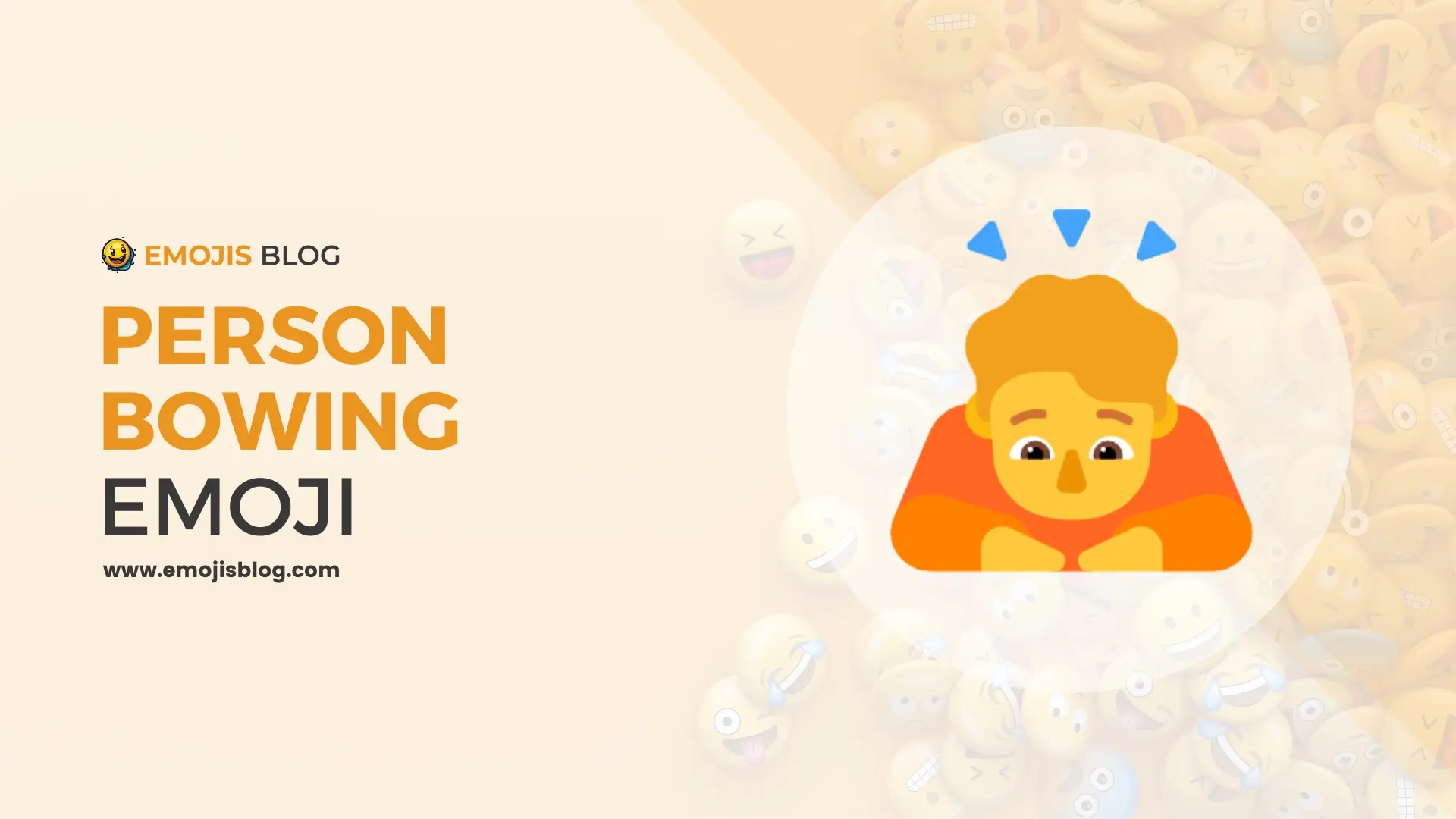What Does The Person Bowing Emoji Mean 🙇
🙇
Person Bowing Emoji Meanings 🙇
The person bowing emoji 🙇 represents a deeply respectful gesture inspired by the Japanese tradition of “ojigi,” where individuals bow to show respect, gratitude, or apology. This emoji depicts a person, often gender-neutral, bowing with a serious or neutral expression, and is commonly used in digital communication to convey humility, deep appreciation, or sincere apologies. While its primary association is with Japanese culture, the person bowing emoji is widely understood and utilized globally to express a range of respectful sentiments.
Technical Information
| Attribute | Description |
|---|---|
| Unicode | U+1F647 |
| Shortcode | :bow: |
| Unicode Version | 6.0 (2010) |
| Emoji Version | 1.0 (2015) |
| Category | People & Body |
| Subcategory | Person Gesture |
| Appearance | A person bowing deeply, with hands on knees or at sides |
| Platforms | Apple, Google, Microsoft, Samsung, Twitter, Facebook, etc. |
| Keywords | apology, respect, bow, gratitude, humility |
| Variations | Gender-neutral, male and female versions on some platforms |
| Related Emojis | 🙇♂️ (Man Bowing), 🙇♀️ (Woman Bowing), 🙏 (Folded Hands) |
| Common Uses | Showing respect, expressing apology, conveying gratitude |
What Does the Person Bowing Emoji Mean? 🙇
The person bowing emoji 🙇, also known as the “person bowing deeply” or “apologizing person” emoji, holds significant cultural and communicative importance, particularly in Japanese culture. This emoji is often used to convey respect, apology, or deep gratitude. Let’s delve deeper into the origins, uses, and meanings of the person bowing emoji.
Origins and Cultural Significance
The person bowing emoji 🙇 is inspired by the traditional Japanese gesture of “ojigi,” where people bow to show respect, gratitude, or apology. In Japan, bowing is a fundamental part of social etiquette and can be seen in various settings, from casual encounters to formal ceremonies. The depth and duration of the bow can vary depending on the situation and the relationship between the individuals involved.
Visual Representation
The person bowing emoji is depicted as a person, often gender-neutral, bowing deeply with their hands on their knees or at their sides. The facial expression is typically neutral or serious, emphasizing the formality and sincerity of the gesture. Different platforms may render the emoji slightly differently, but the core concept remains the same.
Common Uses and Interpretations
1. Showing Respect
In digital communication, the person bowing emoji is frequently used to convey respect or admiration. For instance, when acknowledging someone’s expertise or thanking them for their assistance, this emoji can emphasize the sender’s gratitude and respect.
2. Expressing Apology
The bowing emoji is also widely used to express apologies. In situations where words alone might not suffice, the 🙇 emoji can add a layer of sincerity and humility. It’s particularly useful in formal or semi-formal communications, such as emails or messages to colleagues and superiors.
3. Conveying Gratitude
When words like “thank you” don’t seem enough, the person bowing emoji can help to express deep gratitude. It shows that the sender is truly thankful and acknowledges the receiver’s effort or kindness.
4. Indicating Humility or Submission
In some contexts, the person bowing emoji can indicate humility or submission. For example, it can be used to show acceptance of a mistake or to acknowledge one’s own limitations or errors.
Variations Across Platforms
The appearance of the person bowing emoji can vary slightly across different platforms, such as Apple, Google, Microsoft, and Samsung. While the core depiction remains consistent, the design details, such as the style of the bow, the person’s attire, and the facial expression, might differ. These variations can subtly influence the perceived tone of the emoji.
Combining with Other Emojis
The person bowing emoji is often used in combination with other emojis to enhance its meaning or provide context. For example:
- 🙇🙏: Bowing with hands in prayer, indicating deep apology or respect.
- 🙇💬: Bowing with a speech bubble, showing a humble request or question.
- 🙇❤️: Bowing with a heart, expressing heartfelt gratitude or apology.
Misinterpretations and Cultural Sensitivity
While the person bowing emoji is widely recognized, it’s essential to be mindful of cultural differences and potential misinterpretations. In some cultures, the gesture of bowing might not carry the same significance, and the emoji’s meaning could be misunderstood. It’s always best to consider the cultural context and the relationship with the recipient when using this emoji.
Conclusion
The person bowing emoji 🙇 is a powerful tool in digital communication, allowing users to convey respect, apology, gratitude, and humility with a simple image. Its roots in Japanese culture add depth to its meaning, making it a valuable addition to the emoji lexicon. By understanding its various uses and interpretations, we can use this emoji more effectively and respectfully in our daily interactions.

